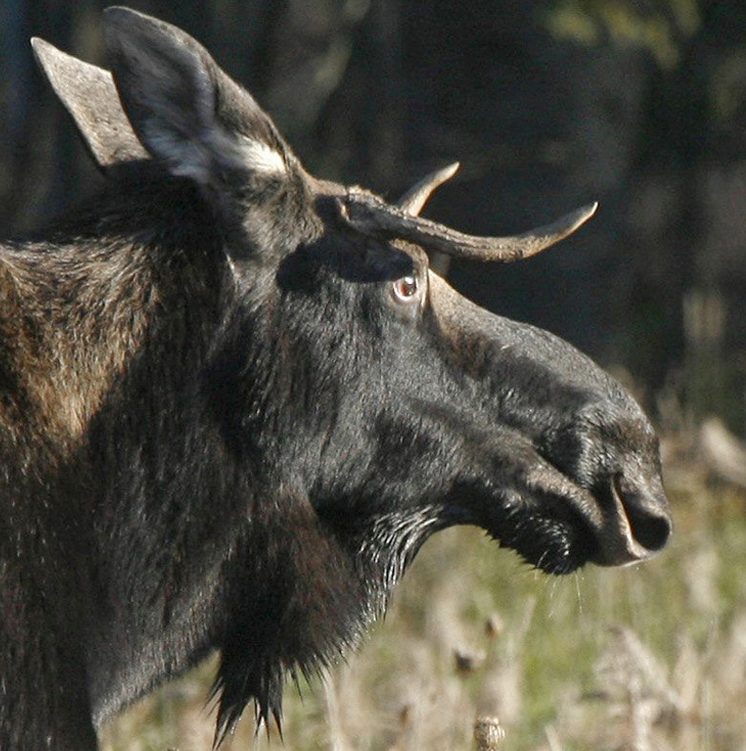MONTPELIER, Vt. – A handful of hopeful moose hunters visited the Vermont Statehouse on Tuesday and joined top Fish and Wildlife biologists and others hunters across the state in listening to a live radio broadcast that revealed the dwindling number of coveted moose hunting permits being issued for the fall hunt.
The 160 permits drawn Tuesday are down about 40 percent from last year and almost 90 percent from the peak years of Vermont moose hunting nearly 10 years ago. The numbers are also down in New Hampshire and Maine.
Moose permits are the hardest license to get for big game hunters in the region and fewer permits make it tough on the hunters, even though the number of applications is also down. The year, the odds of winning a Vermont permit were about 1 in 50.
Given years of declining health of the moose herd caused by warmer weather and ticks that infest the animals’ hides, the state can’t promise the moose hunt won’t have to be cancelled at some point in the future.
“The heyday of moose hunting in Vermont is over and I don’t think it will ever come back,” said Walt Driscoll, a taxidermist from Island Pond, located in an area known as Vermont’s Northeast Kingdom where moose were once so plentiful they became a threat to motorists and the bane of foresters because they would damage young trees.
The number of hunting permits issued each year in Vermont is recommended by biologists who determine the size and health of the moose herd and how many the landscape can sustain. The possibility exists that future hunts could be cancelled.
“It’s one of those year-by-year things,” Fish and Wildlife Director of Wildlife Mark Scott said.
For the last 15 years, Jason Parent, of Northfield, New Hampshire, has run a moose hunting guide service based in northern New Hampshire that also guides hunts in Vermont. He’s expanding this year into Maine.
“The business side of it is tougher, because it’s harder to get customers,” Parent said of the declining moose permits, down to 71 in New Hampshire this year. That’s the lowest number since the moose hunt was resumed in 1988, after the animals had begun returning to the region in numbers large enough to warrant a hunt.
“It’s no problem at all finding the moose,” said Parent, also a Republican state lawmaker.
From those peak years almost a decade ago, Vermont biologists deliberately set out to reduce the size of the herd issuing 1,251 permits in 2007 and 2008. Biologists had hoped the population would stabilized by 2010 or 2011, and about 400 permits could be issued each year, said state moose biologist Cedric Alexander.
But then came warmer weather that hurts moose and the ticks that infest them, driving down their numbers even further. Vermont’s moose herd is currently estimated at about 2,200, below the goal of about 3,000.
Last year, Vermont authorized 265 permits and hunters took 109 moose.
Alexander said he’s cautiously optimistic that by keeping the moose herd at a lower level will keep the remaining moose healthier.
The declining numbers doesn’t diminish the enthusiasm of the people who pay the $10 application fee ($25 for nonresidents) for the opportunity that, for most, is a once-in-a-lifetime opportunity to hunt the largest animal found in the state.
“I’m tickled pink,” said Paul Giacherio, Jr., of Washington, Vermont, who was on hand Tuesday to see his name chosen. “I won’t come down off this high until after the hunt.”
In Vermont this year, the regular moose season runs from Oct. 15-20. The archery season is Oct. 1-7.
Send questions/comments to the editors.



Success. Please wait for the page to reload. If the page does not reload within 5 seconds, please refresh the page.
Enter your email and password to access comments.
Hi, to comment on stories you must . This profile is in addition to your subscription and website login.
Already have a commenting profile? .
Invalid username/password.
Please check your email to confirm and complete your registration.
Only subscribers are eligible to post comments. Please subscribe or login first for digital access. Here’s why.
Use the form below to reset your password. When you've submitted your account email, we will send an email with a reset code.